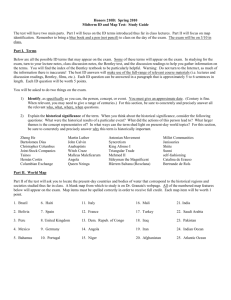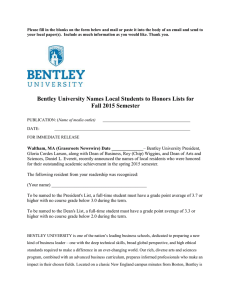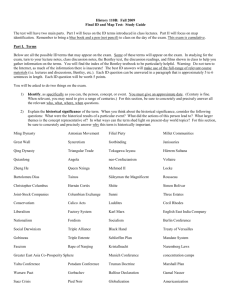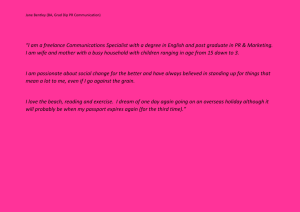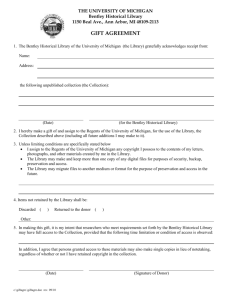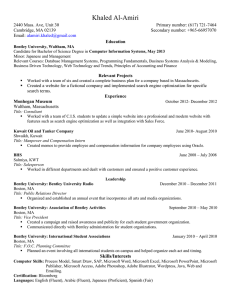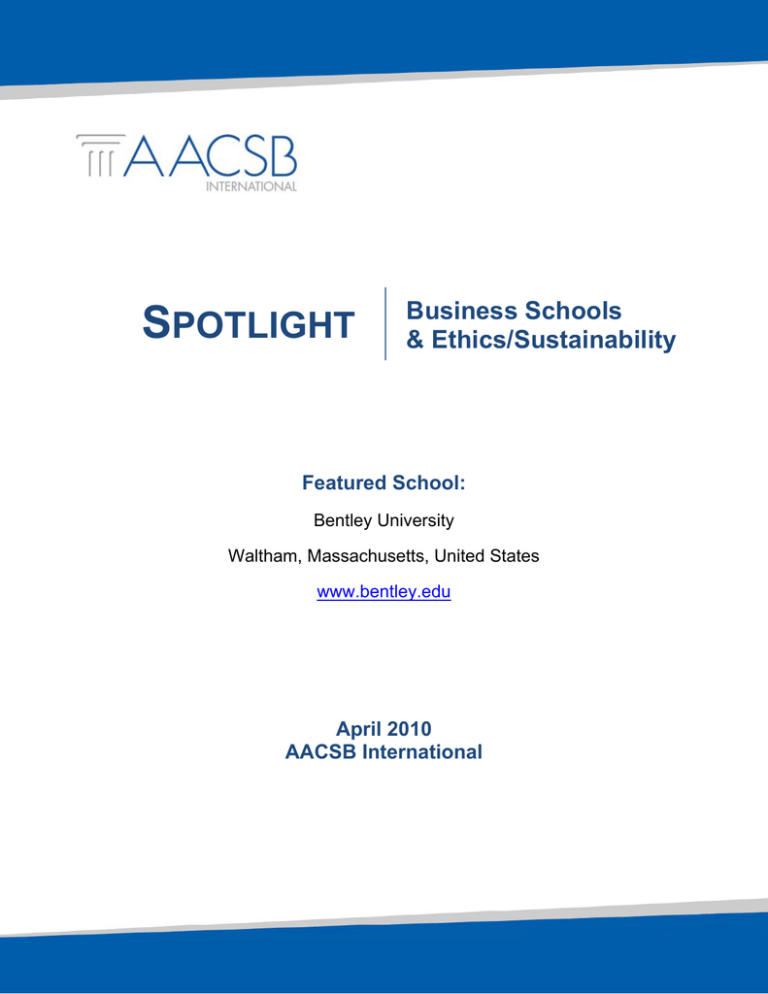
SPOTLIGHT
Business Schools
& Ethics/Sustainability
Featured School:
Bentley University
Waltham, Massachusetts, United States
www.bentley.edu
April 2010
AACSB International
SPOTLIGHT | Business Schools & Ethics/Sustainability
Bentley University | 2
Bentley University’s Ethics and Sustainability Initiatives
Background
With the creation of the Center for Business Ethics (CBE) in 1976, Bentley University has continually
promoted a sense of ethics and social responsibility through teaching, research, institutional practices,
and corporate and community relations for the past three decades. Founded by W. Michael Hoffman,
CBE is dedicated to promoting ethical business conduct in contemporary society. With an international
network of scholars and practitioners, the center serves as a forum for benchmarking and research in
business ethics. This endeavor was given stronger emphasis based on the recommendations of a 2002
task force on ethics, service and social responsibility, convened by Robert Galliers, then Bentley’s provost
and academic vice president. The task force was asked to comprehensively scrutinize the institution’s
status with regard to issues, programs and accomplishments in the areas of ethics, social responsibility,
and civic engagement. Its overall finding was that many initiatives in these areas were underway, all of
them vigorous and successful, but that they would benefit collectively from further collaboration,
coordination and a clear, organizing direction.
As a result of this collective effort, the Bentley Alliance for Ethics and Social Responsibility (see full
article) was created. Launched in the 2003-04 academic year, the alliance’s current mission is to “amplify
and extend the work of the autonomous centers and initiatives on campus, supporting and encouraging
greater awareness of, respect for, and commitment to ethics, service, social responsibility and
sustainability in faculty research, curricula and campus culture.”
Coordinated by management professor Tony Buono, this ongoing initiative is a collaborative effort that is
dependent on the commitment of a broad range of stakeholders, including Bentley faculty, staff, students,
and alumni, as well as business executives, corporate partners, relevant associations, and other colleges
and universities in an effort to enhance and disseminate these ideals. The alliance is built on six “core
pillars” in the Bentley community that continue to operate as autonomous entities, but collaborate
together.
Center for Business Ethics: Founded in 1976, the center is an internationally recognized
center for promoting ethical leadership, conduct, and cultures as critical to an effective and
legitimate role for business in society
o http://www.bentley.edu/cbe
o
Service-Learning Center: Established in 1990, the center which has built a U.S.
reputation (recognized by US News & World Report), seeks to promote academic
learning, to develop socially responsible working professionals, and to assist
community partners in serving the human needs and interests of their
constituencies
o
http://www.bentley.edu/service-learning
© AACSB International. All Rights Reserved.
SPOTLIGHT | Business Schools & Ethics/Sustainability
Bentley University | 3
o
Global CyberLaw Center: Established in 2002, the center focuses on exploring
the vast legal, social, and ethical issues relevant to cyberstudies and e-commerce
o
o
www.bentley.edu/cyberlaw
Women’s Leadership Institute: Created in 2003, the institute focuses on
strengthening the presence of women in society and fostering partnerships with the
business community that highlight and address issues on women in leadership
o
o
Valente Center for Arts & Sciences: Newly created in 2007, the center’s mission
is to help make the arts and sciences a vital, integral, and challenging aspect of
undergraduate and graduate education at Bentley
o
o
www.bentley.edu/wli
www.bentley.edu/arts-sciences-center
Cronin Office of International Education: Initially created in 1987, the office’s
goal is to prepare students to be ethical and responsible participants in the global
business environment, and to foster partnerships with universities, companies, and
governments around the world
www.bentley.edu/international-ed
A unique feature of the alliance continues to be its integrative focus on ethics, social responsibility, civic
engagement and sustainability. BAESR seeks to:
Support and encourage collaborative and applied transdisciplinary research that has the
potential to significantly affect current practice
Influence curriculum development and pedagogical innovations intended to make our
students more ethically sensitive and socially aware
Ensure a broader application of these principles and ideals in campus life
Attempt to foster life-long civic engagement and a commitment to responsive corporate
citizenship among our students
Work closely with external organizations–partnering with academic and professional
associations, corporations, and nonprofit organizations in pursuit of these goals
Combined with a series of programs and activities across the institution, this initiative has led to a fourpart approach that attempts to shape and influence a sense of ethics, service, and responsibility
throughout (1) the curriculum and academic life, (2) campus life, (3) the university’s research agenda, and
(4) in outreach to the academic, corporate and nonprofit worlds.
Curriculum and Academic Life
Teaching Business Ethics Faculty Development Workshop
As a way of influencing curriculum development (at both the undergraduate and graduate level) at the
college, in 1988 the Center for Business Ethics (CBE) began working with the chairs of Bentley’s
accountancy, law and computer information systems departments, providing them with assistance in
integrating ethics into their departmental courses. The subsequent work with these departments, and its
© AACSB International. All Rights Reserved.
SPOTLIGHT | Business Schools & Ethics/Sustainability
Bentley University | 4
success in elevating the visibility of ethics in their curricula and stimulating faculty research in this area,
prompted CBE to transform this initiative into a formal workshop. The first session was offered in May
1991 and continues today.
Initially referred to as the Business Ethics "Gadfly" Workshop, the intent has remained the same since its
inception–to encourage faculty to address ethical issues and questions of corporate social responsibility
in courses across Bentley’s curriculum. The ‘gadfly’ reference dates back to Socrates, who described
himself as a "gadfly," a stinging insect whose purpose was to harass and "sting" the citizens of Athens out
of their ignorance and intellectual complacency. By "seeding" each academic department with such
gadflies, the goal was to develop a core group of faculty who would prod and influence their colleagues to
incorporate informed discussions of ethical issues and corporate responsibility in their classes.
Each May, eight Bentley faculty members have gotten together for a five-day workshop to explore ways
of integrating ethical issues into their disciplinary courses. The workshop is designed to accomplish this
goal through: (1) facilitated discussions among faculty from several different disciplines intended to
provide them with a basic grounding in ethical theory and corporate responsibility, and (2) presentations
by the faculty participants on integrating ethics into their courses, with the opportunity for feedback from
the workshop facilitators and other participants. Guest speakers have included representatives from the
Ethics Officer Association, Fortune 500 Ethics Officers, and Boston-area business people who are
responsible for ethics and corporate social responsibility initiatives. Over the years, corporate sponsors of
the program have included the GE Foundation, Guardsmark, Liberty Mutual, Monsanto, Sears, Texas
Instruments, and Verizon.
In 2005, building on the generous support of the State Street Foundation, this program evolved in to the
Bentley Global Business Ethics Symposium and Faculty Development Teaching Workshop. Faculty from
around the world join Bentley faculty in this endeavor. To date over 150 Bentley faculty and 60 faculty
members across the globe have participated in the program. For a fuller discussion of the program, list of
external participants and copies of the workshop agendas for the past several years go to:
http://www.bentley.edu/alliance/global_business_ethics_teaching_workshop.cfm
Through this program, ethics have been integrated throughout the business core, as well as departmental
courses in management and organizational behavior, accountancy, finance, CIS, and marketing. At the
undergraduate level, students are also required to take an integrated business core that includes focused
modules on ethics, corporate responsibility and sustainability. At the graduate level, MBAs have a
required course on "Leadership, Ethics and Corporate Responsibilities." Both programs are also
supported by an array of electives, including PH130 "Corporate Social Responsibility," PH131
"Philosophy of Work," and PH133 "International Business Ethics Business Ethics" at the undergraduate
level, and ETH700 "Ethical Issues in Corporate Life," ETH750 "Managing Ethics in Organizations," and
ETH810 "Research in Business Ethics" at the graduate level. Bentley also offers a concentration in
business ethics in the MBA program and a minor in cyber law (with a strong ethics and social
responsibility component) at the undergraduate level. The Ph.D. program also has a required course for
all doctoral students on “Ethics and Corporate Social Responsibility.”
A sampling of this focus and integration can be found at:
http://www.bentley.edu/alliance/teaching.cfm
Liberal Studies Major (LSM)
As part of our undergraduate program, Bentley has created an optional second major that complements a
business major with a concentration built around a particular theme of interest. The impulse behind the
LSM is to help students increase the value and meaning of their liberal arts education by combining some
required courses in the general education curriculum with arts and sciences electives and some business
© AACSB International. All Rights Reserved.
SPOTLIGHT | Business Schools & Ethics/Sustainability
Bentley University | 5
electives within a concentration. The LSMs include majors in ethics and social responsibility (designed to
create a framework for more fully understanding these issues in work and life), earth, environment and
global sustainability (focused on developing insights into environmental systems and the economic,
political and social constructs necessary to achieve sustainable development on a worldwide scale), and
global perspectives (focused on understanding the global economy as well as distinct regions and
cultures, with an emphasis on understanding diverse ways of thinking, communicating, acting, doing
business and governing).
http://www.bentley.edu/undergraduate/academics/lsm.cfm
From the “Class Book” to Complex Problems / Creative Solutions
From 2002-2008, Bentley identified a “class book” that has been assigned to the incoming freshman
class. Entering students were expected to read the book during the summer and complete a three-page
essay on the issues raised in the book, to be handed in when they come to campus. The book was
discussed in first-year courses and served as the focus of a series of activities, including panel
discussions, community conversations, a film series and Web site. One of the selection criteria for the
class book is the extent to which it raises questions of ethical and socially responsible behavior. The
resulting opportunities for shared academic interaction were intended to create a central intellectual focus
for the first-year class and others in the institution who care to join in.
2002: King Leopold's Ghost by Adam Hochschild
2003: The Lexus and the Olive Tree by Thomas Friedman
2004: Fast Food Nation by Eric Schlosser
2005: The Cheating Culture by David Callahan The Cheating Culture by David Callahan
2006: The Travels of a T-Shirt in the Global Economy by Pietra Rivoli
2007: iTuned In or Out?, a collection of essays selected by the class book committee, exploring
the potential impacts, both subtle and obvious, that technologies can have on our
individual psychology, interpersonal relations and social organizations.
2008: The Pursuit of Happiness?, a collection of essays by the class book committee
exploring the complex and challenging relationship between money and happiness
www.bentley.edu/classbook/class-of-2012/index.cfm
Beginning fall 2009, the class book program was phased out and replaced with a new program, “Complex
Problems / Creative Solutions” (CP/CS). Because ethical, effective, and nuanced problem solving is
required of future business leaders, Bentley is piloting the CPCS program, which is designed to enable
students to study a globally important, difficult problem from the perspectives of both business and arts
and sciences disciplines, thereby, developing skill in the kind of “kaleidoscope thinking” creativity
requires. CPCS will integrate classroom and extracurricular learning as well as disciplinary approaches to
problem solving by including guest speakers, corporate site visits, and film viewing.
Students enrolled in CP/CS join other students in classes that are thematically linked to an over-arching
theme: “The Unintended Consequences of our Consumer Choices.” Beginning in fall 2009, for the next
two years, 60 Bentley students will focus on environmental sustainability in general and the challenge of
“techno-trash,” in particular, examining in detail what happens when we dispose of our cell phones, iPods,
computer and other electronic gadgetry. Throughout the program, emphasis is placed on learning to solve
real-world issues on a global scale.
http://www.bentley.edu/complex-problems-creative-solutions
© AACSB International. All Rights Reserved.
SPOTLIGHT | Business Schools & Ethics/Sustainability
Bentley University | 6
Campus Life
The Bentley Beliefs
As part of an attempt to maintain and nurture the college community and to maximize the potential for
learning, the institution embraces what we refer to as the Bentley Beliefs, a set of principles that govern
conduct in classrooms, residence halls and places of work:
We strive at all times to treat one another with respect
We acknowledge and learn from our differences
We act with integrity and honesty in our academic, personal and professional affairs
We seek to further the growth and learning of each member of our community and ourselves
At the beginning of each academic year, the incoming class cites and pledges their commitment to these
beliefs.
www.bentley.edu/about/beliefs.cfm
Annual Business Ethics Lectures
Building on these principles, the next dimension of the strategy is to go beyond the classroom and
curriculum, supporting classroom-based discussions of ethics and corporate responsibility through extracurricular activities. Among its myriad initiatives, for example, CBE hosts the annual Raytheon
Lectureship in Business Ethics, bringing prominent CEOs to campus to talk about ethics and corporate
responsibility in their companies. Recent Raytheon lectures have included Raymond Gilmartin (Merck),
Anne Mulcahy (Xerox), Jamie Gorelick (board member, United Technologies Corporation), Michael
Ruettgers (EMC Corporation), Tom Chappell (Tom’s of Mine), and Howard Putnam (Southwest. Airlines,
Braniff Airlines). CBE also hosts the Verizon Visiting Professor of Business Ethics. For one week each
spring, a prominent business ethics scholar is invited to campus, giving public lectures, visiting classes
and, in general, promoting greater awareness of ethical issues. Past Verizon professors have included
such noted ethics scholars as Richard DeGeorge, Norman Bowie, Thomas Donaldson, Laura Hartman,
Rush Kidder, Thomas White, and John Boatright. The other centers also sponsor a series of speakers
and events that reinforce issues of ethics and corporate responsibility.
http://www.bentley.edu/cbe/events/lecture-raytheon.cfm
http://www.bentley.edu/cbe/events/lecture-verizon.cfm
Academic Integrity
During 2003 through the alliance, the issue of ethics and personal responsibility became the foundation
for Bentley’s new Academic Integrity System (AIS). Developed jointly by students, faculty, and
administration, the AIS sets and regulates standards of academic integrity throughout the college. An
academic integrity coordinator (AIC) oversees and facilitates the system’s procedures for insuring fair and
effective implementation. The AIC also provides educational outreach to students and faculty, and is
available to consult with faculty to determine how to proceed with a suspected violation, assist faculty with
investigations, and consult with both faculty and students once a violation is alleged. Finally, an academic
integrity board, which consists of faculty and students, becomes involved (1) when there is a prior record
of academic dishonesty, (2) in cases that remain unresolved between student and instructor/ college
official, (3) when the AIC determines that a hearing is the most effective means of resolving a case, (4)
when certain sanctions are recommended, and/or (5) in cases that represent the most serious breaches
of intellectual honesty. In these cases, it is the responsibility of theb to determine whether or not there has
been a violation and what, if any, sanction should be imposed. Combined with outreach to the student
© AACSB International. All Rights Reserved.
SPOTLIGHT | Business Schools & Ethics/Sustainability
Bentley University | 7
population – both undergraduate and graduate–about the importance of academic honesty and integrity,
a goal is to instill a commitment to ethical behavior as part of business education (and subsequent
practice).
www.bentley.edu/alliance/acadintegrity.cfm
Service-Learning
Students also have the opportunity to directly immerse themselves in the surrounding community through
the Bentley Service-Learning (S-L) Center. Over each of the past four academic years, the S-L program
has averaged more than 650 students in 90 credit-bearing courses, taught by over 60 faculty members in
10 different departments.
http://www.bentley.edu/service-learning
Civic Leadership Program: Graduation Pledge Alliance
The visibility of the Alliance and Service-Learning Program has also prompted undergraduate students to
get more actively involved through the Bentley Civic Leadership Program (BCLP), which is the Bentley
chapter of the Graduation Pledge Alliance. The BCLP, which is student initiated and led, has three foci:
campus involvement, civic engagement, and ethical and responsible behavior. Campus Involvement is
designed to encourage students to become actively involved early in their undergraduate career, helping
them feel comfortable in becoming a leader within their immediate community. Civic Engagement is
intended to facilitate student appreciation of the importance of the greater community, which includes
aspects of political participation, cultural awareness, and service, with an emphasis on experiences that
lie outside of Bentley. Finally, Ethical and Responsible Behavior is designed for students to realize the
importance of ethics and social responsibility in their lives. Emphasis is placed on striving for exemplary
behavior, being a role model, and active and responsible involvement.
http://www.bentley.edu/alliance/bclp
Ethics Policy / Faculty and Staff Workshops
A campus-wide commitment to these ideals is further reflected in the university’s campus-wide college
ethics policy and oversight committee. Additionally, the Alliance supports diversity workshops for faculty,
staff and students (e.g., "Day to Day Diversity," "Becoming an ‘Ally’ on Sexual Identity Issues"), and a
series of campus-wide panels and presentations on current issues, from peer-to-peer file sharing to
business ethics and the arts.
http://www.bentley.edu/alliance/ethicspolicy.cfm
http://www.bentley.edu/diversity/index.cfm
http://www.bentley.edu/diversity/activities-and-events.cfm
Sustainability
In 2007, President Gloria Larson signed the American College and University Presidents Climate
Commitment, pledging to eliminate Bentley’s greenhouse gas emissions over time. The commitment
© AACSB International. All Rights Reserved.
SPOTLIGHT | Business Schools & Ethics/Sustainability
Bentley University | 8
involves: 1) completing an emissions inventory; 2) setting a target date and interim milestones for
becoming climate neutral; 3) taking immediate steps to reduce greenhouse gas emissions through shortterm actions; 4) integrating sustainability into the curriculum and making it part of the educational
experience; and 5) making the action plan, inventory, and progress reports publicly available.
The signing of the climate commitment spurred the creation of a the Sustainability Task force, which is a
coalition of faculty, staff, students, and alumni dedicated to fostering sustainability initiatives. The task
force’s mission is to:
Develop, and assess initiatives to improve sustainability on campus
Provide the steering committee with recommendations for university-wide sustainability policies
Provide the Bentley community with information and education about sustainability efforts
Promote environmental consciousness across campus operations
As part of Bentley’s climate commitment, all new construction will be built to LEED-silver standards.
Leadership in Energy and Environmental Design (LEED) is an internationally recognized green building
certification system developed and run by the U.S. Green Building Council (USGBC).
In addition, Bentley has become a member of the USGBC, an energy star partner, and an early adopter
of the INFOR EAM green application, which monitors electricity consumption by equipment allowing
facilities to perform maintenance on this equipment when the electrical consumption starts to rise.
A complete overview of programs, initiatives and projects is available at:
http://www.bentley.edu/sustainability
Bentley Microfinance Initiative
The student-run Bentley Microfinance Club (BMC) strives to integrate microfinance into the Bentley
community and to promote community development through education and innovation in microlending
activities. The club promotes microfinance by selecting loan candidates, monitoring loan portfolios,
working with external partnerships, networking, and providing business plan assistance. Key objectives
of the club are education, community development, operational sustainability, and innovation. BMC is
unique in that members merge business experience with service–it is one of the first U.S. student run
microfinance funds in the greater Boston area.
The club was formed following an undergraduate honors finance course–“Seminar in Micro-Lending”–
that paved the way for an innovative financing initiative: a domestic microcredit organization intended to
fuel economic and community development by providing loans of 1,500 USD to 6,000 USD to local
entrepreneurs at or below the poverty level. Students enrolled in the honors seminar developed a working
model for the Bentley Microcredit Initiative (BMI) after researching microfinance successes and failures
both abroad and domestically to create a framework that could operate in Boston. The fund is being
financed by donations from alumni and parents and has an initial equity line of 100,000 USD on its way to
a
total
loan
portfolio
of
300,000
USD.
The Production of Knowledge
In addition to the research interests of individual faculty, Bentley also encourages and sponsors applied
transdisciplinary research, emphasizing collaborative projects that involve faculty members across
different academic departments and research streams that have the potential to significantly affect current
practice. In conjunction with a Risk Management Research Program, BAESR also supports
interdisciplinary research on governance, strategy and corporate integrity, and sponsors campus-wide
panels and presentations on current issues. The Institute for Women in Leadership similarly sponsors
© AACSB International. All Rights Reserved.
SPOTLIGHT | Business Schools & Ethics/Sustainability
Bentley University | 9
collaborative research on women in the organizational world, the Cyberlaw Center stimulates research on
the growing field of cyberstudies, and the Cronin International Center encourages work on global ethics
and corporate responsibility issues through its Faculty Research Fellows Program. Finally, the Center for
Business Ethics undertakes research–surveys, studies and data syntheses–of trends in business ethics,
and publishes Business and Society Review in partnership with Blackwell Publishers.
A list of faculty research and publications is available at:
www.bentley.edu/academics_research/faculty_research/faculty_database
Next Generation Scholars Workshop
The Next Generation Workshop focusing on Environmental, Social and Governance (ESG) issues is a
week-long program that brings together promising young doctoral researchers and world-leading experts
in ESG related research and practice for the purpose of fostering these young researchers’ talents. The
program aims to establish a dialogue between present and future ESG researchers, involving scholars
from different disciplines with the underlying goal of supporting interdisciplinary conversations.
In May 2009, three internationally recognized experts and four doctoral students (selected competitively)
were invited to the Bentley campus in conjunction with the Global Business Ethics Symposium and
Teaching Workshop sponsored by the State Street Foundation. The experts and students engaged in a
series of presentations and discussions (including detailed one-on-one feedback between expert and
student), with the goal of promoting practically relevant research in the ESG area. Students also had the
opportunity to participate in the internationally recognized Bentley teaching-ethics workshop occurring the
same week.
Visiting faculty for the inaugural Next generation ESG scholars workshop were:
Blair Feltmate, Director of Sustainable Development, Ontario Power Generation
Lori Verstegen Ryan, Professor of Management and Director, Corporate Governance Institute, San
Diego State University
Duane Windsor, Lynette S. Autry Professor of Management, Rice University
The first group of Next Generation ESG Scholars were:
Julia Dare, University of Southern California (California, 2009)
Yuliya Shymko, Institute Empressa (Spain, 2009)
Rieneke Slager, Nottingham University (England, 2009)
Thomas Thijssens, Maastricht University (Netherlands, 2009)
Planning for the 2010 program is in progress; for details see:
http://www.bentley.edu/alliance/global_business_ethics_teaching_workshop.cfm
Geneen Institute for Corporate Governance
Established in 2008 through the generosity of the Harold S. Geneen Charitable Trust, the Geneen
Institute is dedicated to the pursuit of directed, leading-edge research on important corporate governance
issues via a consortium of faculty and Ph.D. students dedicated to researching social, comparative and
reformative approaches to governance. As a central part of the educational process, the fellows
undertake an in-depth doctoral research internship. These research opportunities are designed to take
place in corporate and/or professional organizational settings over an extended period in order to foster
the student’s research along with the site organization’s own goals.
© AACSB International. All Rights Reserved.
SPOTLIGHT | Business Schools & Ethics/Sustainability
Bentley University | 10
www.bentley.edu/geneen/index.cfm
The first two Geneen fellows are Darin "Kip" Holderness, Geneen Fellow in Accountancy, and Ada Jin
Wang, Geneen Fellow in Business.
The Geneen Institute of Corporate Governance is offering two Ph.D. fellowships in 2011 in six broad
areas of corporate governance:
1.
2.
3.
4.
5.
6.
Ethics and corporate boards
Regulation and compliance
Social and environmental reporting
Corporate social responsibility
Executive compensation
Corporate governance and women in leadership positions
Corporate governance is broadly defined as embracing the rights and responsibilities among all parties
who have a stake in the firm. In doing so, our faculty and doctoral students will focus on the ways in which
policies, processes and people are used to fulfill these rights and responsibilities. At the Geneen Institute,
we believe that the center of corporate governance should focus on promoting integrity and accountability
within and across organizations from a financial, environmental and social vantage point.
The Geneen Doctoral Fellows will conduct quantitative and qualitative research that focuses on
understanding what can foster good corporate governance, examining this at multiple levels, from
individuals through organizations to institutions and regulations. They will also consider what the shortand long-term impact of good governance is on individual businesses and societies, both local and global.
The ultimate goal of the Geneen Doctoral Fellowship is to create a bridge between academic research
and practical application. In this way, the fellows will look objectively at a variety of issues related to
corporate governance, many of which will have direct impact on business and the broader stakeholder
and stockholder environments.
http://www.bentley.edu/geneen/index.cfm
Ph.D. Program
Bentley’s doctoral program also includes a number of students focusing on business ethics and corporate
social responsibility. This concentration includes research on business ethics, civic engagement and
social responsibility in general, as well as a seminar in social, environmental and governance issues. The
types of issues our doctoral students are pursuing includes such topics as corporate governance and
ethical conduct, corporate social responsibility and profitability, reputational capital, social and financial
performance, stakeholder management and the social role of business, women in leadership, and risk
management.
In partnership with the State Street Foundation, Bentley also launched the State Street Doctoral
Fellowship in Corporate Social Responsibility. The first recipient of the State Street Doctoral Fellowship is
Ms. Elise Perrault Crawford. Elise, who holds an MBA from McGill University, began the program in Fall
2008 and is currently in her second year. She recently presented at the 8th Annual Colloquium of the
European Association of Business in Society (EABIS). Her paper focused on the socio-cultural, regulatory
and normative motivations in voluntary reporting practices in the banking industry. She also spoke at the
Conference Board’s fall meeting of the Center for Corporate Citizenship and Sustainability in October
2009.
Institutional Review Board (IRB)
© AACSB International. All Rights Reserved.
SPOTLIGHT | Business Schools & Ethics/Sustainability
Bentley University | 11
In accordance with university’s mission, Bentley’s IRB is committed to ensuring the safe and ethical
treatment of human participants in our research. Federal and university regulations stipulate that all
faculty, staff, and student research projects, involving human subjects, are reviewed and approved by the
IRB prior to their initiation. This requirement covers all human participant research conducted at, or
sponsored by, Bentley, and all research involving human subjects conducted at other institutions in which
Bentley faculty, staff, or students will be involved. Our ultimate goal is to provide timely service, support
and assistance in promoting the ethical conduct of all research involving human subjects and to assure
the safety, rights and welfare of all participants in our research projects.
www.bentley.edu/alliance/irb.cfm
Outreach
The final component of Bentley’s approach is outreach to other colleges and universities, the corporate
sector and the not-for-profit world.
UN Global Compact: Academic Network / Principles for Responsible Management
Education (PRME)
As a signatory of the UN Global Compact’s PRME initiative, Bentley is committed to ensuring that these
Principles inform our teaching, research, interaction with key stakeholders, and how we operate as an
institution. Our Communication on Progress reports for AY 2006-07, AY2007-08 and AY2008-09 are
available at:
http://www.bentley.edu/alliance/UN_Global_Compact_Academic_Network.cfm
Global Teaching Business Ethics Workshop
As part of the Center for Business Ethics’ programs, for example, the 2004 Business Ethics Gadfly
workshop went global, inviting visiting scholars from Budapest University (Hungary), the University of
Pretoria (South Africa), the Norwegian School of Management (Sandvika, Norway), York University
(Toronto, Ontario), IAE (Argentina), L'Ecole de Management de Lyon (France), DePaul University
(Chicago) and Western Washington University (Bellingham, WA) to join Bentley faculty. This past May
(2005), State Street Corporation became the program sponsor, and the workshop was expanded to 20
faculty (8 from Bentley, 12 from other institutions). Visiting faculty came from the Stockholm School of
Economics (Sweden), University of Asia & the Pacific (Philippines), Jerusalem College of Technology
(Israel), Xiamen University (China), New York Institute of Technology (NY), Prairie View A& M University
(TX), University of Seattle (WA), University of Southern California (CA), University of Baltimore (MD),
University of Maryland (MD), Western Washington University (WA), and Andover Newton Theological
School (MA).
To date the program currently has over 60 external workshop alumni. For a list of participants and
overview of the program, go to:
http://www.bentley.edu/alliance/global_business_ethics_teaching_workshop.cfm
Global Business Ethics Symposium sponsored by the State Street Foundation
As an extension of the teaching workshop, a day-long symposium on ethical issues was also added that
is open to other academic institutions and the corporate and not-for-profit sectors. The intent of the
© AACSB International. All Rights Reserved.
SPOTLIGHT | Business Schools & Ethics/Sustainability
Bentley University | 12
symposium is to bring together international experts for in-depth discussions of current practices and
challenges in business ethics and corporate responsibility. The purpose of the day long event is to both
learn and inform by:
Exploring current practices in other institutions, countries and cultures
Identifying ways to enhance issues of ethics and corporate responsibility in business education
and in outreach to the corporate community
Disseminating this experience throughout the academic and practitioner worlds.
Planning for the 2010 program is currently in progress. The symposium is tentatively focused on: “What is
Sustainability” Differing Perspectives on Sustainable Business Practice in the Global Context.” We are
also exploring the possibility of holding the 2011 program at Zhejiang University, Hangzhou, China.
2010: What is Sustainability? Differing Perspectives on Sustainable Business Practice in the
Global Context
2009: Building Responsible Global Cultures: The Role of Ethics, Corporate Social Responsibility
and Sustainability.
2008: Ethics, Governance and Enterprise Risk Management: A Global Perspective.
2007: Business Ethics and Corporate Social Responsibility: Different Sides of the Coin? A
Comparison of European and North American Perspectives (in partnership with the
Universidad Pontificia Comillas, in Madrid, Spain).
2006: Corporate Social Responsibility in the 21st Century: Coping with Globalization.
2005: Ethics and Risk Management in a Global Environment.
www.bentley.edu/symposium
Bentley-TIME Leadership Forum and the Tomorrow25
Bentley and TIME Magazine have partnered to address critical issues of the day in an annual leadership
forum. Held during the spring semester on the Bentley campus, the Forum spotlights issues in business
ethics, leadership and social responsibility across a variety of industries. The 2010 program will continue
the successful theme of “The Business of Healing Our World,” focusing on “Accountable Leadership in
Action.”
The 2010 program speakers include: Dr. Mehmet Oz, one of America's foremost cardiothoracic surgeons;
Majora Carter, president of The Majora Carter Group, LLC; Julie Cottineau, vice president of Brand, Virgin
USA; and Ted Hoff, vice president, Center for Learning and Development, IBM Corporation.
The leadership forum series to date:
2009 Forum: The Business of Healing Our World: Leveraging Innovation, Social Enterprise and
Service.
2008 Forum: The Business of Healing Our World: The Global Imperative to Do Good.”
2007 Forum: The Business of Healing Our World
2006 Forum: Global Perspectives in Times of Dramatic Change.
2005 Forum: Can Social Responsibility Be Profitable?
www.bentley.edu/leadership-forum
© AACSB International. All Rights Reserved.
SPOTLIGHT | Business Schools & Ethics/Sustainability
Bentley University | 13
The Tomorrow25 is an international leadership competition launched in 2005 by Bentley to identify
exemplary leaders of tomorrow. Each year, the 25 winners receive national recognition and interact with
high-profile leaders at the annual Leadership Forum (all expenses paid), in cooperation with TIME
Magazine. The Tomorrow25 students also appear in an ad in TIME Magazine as part of
Bentley’s national campaign. The Tomorrow25 winners are chosen through an international nomination
process, and selected by an international advisory board, established by Bentley.
http://tomorrow25.bentley.edu/
Conscious Capitalism
Building on the success of the first practitioner-centric conference–Catalyzing Conscious Capitalism® in
Austin, Texas in November 2008–the 2009 and 2010 Bentley University gathering of thought leaders is
laying the intellectual and conceptual foundations of the field, identifying challenges and key research
questions. Focused on the theme of “Conceptualizing Conscious Capitalism,” the term reflects the fact
that more people today are at higher levels of consciousness about themselves and the world around
them than ever before. This is due in part to natural evolution, but also to the rapid aging of society, which
has resulted in a higher proportion of people in mid-life and beyond, when consciousness is raised and
higher-level needs predominate. The advent of the World Wide Web has accelerated this trend,
simultaneously connecting hundreds of millions of people and placing great demands for transparency on
companies.
The definition of conscious capitalism has three key elements:
companies have a purpose that transcends profit maximization
companies are managed for the benefit of all stakeholders in their ecosystem, not just
shareholders
companies are led by spiritually evolved, self-effacing servant leaders
Companies that practice conscious capitalism embody the idea that profit and prosperity go hand in hand
with social justice and environmental stewardship. They operate with a systems view, recognizing and
benefiting from the connectedness and interdependence of all stakeholders. They tap into deeper
sources of positive energy and create greater value for all stakeholders. They utilize creative business
models that are both transformational and inspirational, and can help solve the world’s many social and
environmental problems.
http://www.bentley.edu/conscious-capitalism/index.cfm
The Bentley-Mmofra Trom Partnership
The goal of Bentley’s involvement with the Mmofra Trom Center is to contribute to its own intention of
become self-sustaining in ten years’ time. With the successful development of this 38-acre site near the
village of Trom in the Somanya Region of Ghana, children orphaned by AIDS can live near their original
home instead of joining the throngs of AIDS orphans who become street children in Accra, the capital city
which is roughly an hour’s drive away. Villagers in this economically depressed area can also find new
opportunities as the site becomes more developed.
Bentley has also established an economic development partnership with the Mmofra Trom Center, such
that Bentley will assist the center in developing sustainable sources of income to eliminate dependence
© AACSB International. All Rights Reserved.
SPOTLIGHT | Business Schools & Ethics/Sustainability
Bentley University | 14
on private donations. Mmofra Trom (MT) represents a life-changing learning opportunity for Bentley
students, where they will also be able to share business skills with youth who want to begin small
businesses and develop job skills. While building one-to-one relationships with the children of Mmofra
Trom, Bentley students will learn the complexity of issues that work for and against economic
development and the alleviation of poverty in the developing world. Further, they will have the opportunity
to witness first-hand the systemic relationship between education, healthcare, political forces, economic
opportunity and culture. Learning to “enable without disabling” will be a key component of student
learning.
The program includes 8-week internships and 14-day intensive courses with a 20-hour service-learning
component, both on-site, which focus on such projects as: training teachers and students to use
computers in educational settings, setting up an accounting system for the MT school and for the project
in general, developing marketing plans for attracting street children to the site for daytime activities,
developing and submitting grant proposals, developing small business plans in conjunction with older
teen-agers, and developing a long-range strategic and financial plan for Mmofra Trom.
Complete information on the Bentley-Mmofra-Trom initiative can be found at:
www.bentley.edu/ghana/index.cfm
City Year Partnership: The “Give a Year” Program
During AY 2008-09 Bentley undertook a new venture with City Year–The Bentley—City Year Give- aYear Partnership, a new program that will enable young people who volunteer for a service year with City
Year to enjoy a variety of benefits as Bentley students, including a $20,000 Give-a-Year scholarship from
Bentley, Bentley service-learning credits, and internship opportunities with leading global corporations.
The initial plan was that Bentley would award up to 10 scholarships annually to Bentley National Service
Scholars who participate in the program. The “Give-a-Year” Scholarship Program provides selected
Bentley students with scholarships for spending a year serving as a City Year Corps Member. As tutors,
mentors, and role models, you and other idealistic leaders will be able to make a difference in the lives of
children, and transform schools and neighborhoods in 18 U.S. locations. Through service with City Year,
Corps Members build on their own strengths and assets, and learn new skills as they achieve their
service and professional goals. Clear guidance, constructive training and coaching, and feedback are
provided often so that all Corps Members have the greatest opportunity to succeed. Each Corps Member
is assigned to a team and learns about the team's specific service focus during Basic Training Academy.
Training will be provided to prepare the team to deliver that service effectively. In some cases, corps
members are trained by the school system in which they work.
Bentley undergraduate students who apply for and are awarded a “give a year” scholarship will receive a
20,000 USD credit toward their senior year Bentley tuition. Bentley graduate students who apply and are
awarded the scholarship will receive the 20,000 USD tuition credit for their graduate study. All “give a
year” scholars must apply for and be accepted as a Corps Member by City Year as well. In addition to
receiving the 20,000 USD tuition credit from Bentley, “give a year” scholars will receive a 4,725 USD
education award from AmeriCorps. Additionally, as City Year Corps members, the students will receive a
weekly stipend to defray living expenses during your service year, health insurance, deferment of any
college loan payments during your service year, an orientation and training program at the start of
service, weekly leadership development sessions throughout your service year, a uniform, a cell phone,
and a public transit pass.
Additional information on the program can be found at:
www.bentley.edu/service-learning/give-a-year.cfm
© AACSB International. All Rights Reserved.
SPOTLIGHT | Business Schools & Ethics/Sustainability
Bentley University | 15
Ethics and Compliance Officer Association
Working with the Ethics and Compliance Officer Association, which was established through the Center
for Business Ethics (CBE), CBE offers a “Managing Ethics and Organizations” (MEO) program. Since
1995, over 450 ethics and compliance officers and graduate students have competed the 5-day MEO
course. Over the years, the course has provided attendees with practical advice and tools for creating
and managing an effective ethics and compliance initiative. Hallmarks of the program include:
An outstanding faculty of experienced ethics officers and nationally recognized subject-matter
experts
In-depth sessions devoted to the Impact of the Current Legal and Regulatory Environment on
Ethics and Compliance Programs, Managing Helplines, Globalizing an Ethics Program, Ethical
Reasoning, and Managing Change
Interactive sessions, extensive Q&A and the opportunity to form an invaluable network of
colleagues and peers
www.bentley.edu/cbe/events/programs-managing.cfm
Assessment
A unique feature of this four-part approach is its collaborative and integrative focus, drawing together an
emphasis on ethics, social responsibility, civic engagement and sustainability across the entire campus. A
lingering question, of course, is whether any of this really makes a difference. While anecdotal evidence
to date is encouraging, we are currently in the process of systematically assessing the effectiveness of
this approach through our Assurance of Learning initiative.
MBA Program: Students graduating from the Bentley MBA program will have the ability to
recognize, value, and make decisions based on professional integrity and corporate
responsibility.
Student papers in the required “Leadership, Ethics and Corporate Responsibilities” course will be
examined by outside reviewers to determine the extent to which the students are able to:
1. Recognize organizational issues that have ethical implications
2. Identify alternative solutions to address ethical issues and /or dilemmas
Undergraduate Program: As part of a long-term assessment project, the entire 2009 incoming
freshman class (approximately 950 students) completed the Defining Issues Test (DIT) and a
simulation in Bentley’s Trading Room where they had the opportunity to engage in insider trading.
The DIT will be repeated at the end of their freshman year and for each year during their
undergraduate career; the Trading Room simulation will also be repeated at the end of their
sophomore and senior years. The assessment project will examine changes in student ethical
reasoning (DIT) and behavior (Trading Room simulation) following coursework and extracurricular
activities emphasizing ethics, social responsibility, civic engagement and sustainability.
The alliance has also increased the visibility of many of these activities and programs, both on campus
and with the outside world. As noted above, as we continue to move forward with our Assurance of
Learning initiative, the plan is to continue to explore and assess the overall effectiveness of this approach.
At present, however, it seems to be a step in the right direction.
© AACSB International. All Rights Reserved.
SPOTLIGHT | Business Schools & Ethics/Sustainability
Bentley University | 16
Additional Information:
Anthony F. Buono, Ph.D.
Professor of Management and Sociology
Executive Director, Bentley Alliance for Ethics & Social Responsibility
Adamian Academic Center 315
Bentley University
E-mail: abuono@bentley.edu
175 Forest Street
Web: www.bentley.edu/alliance
Waltham, Massachusetts 02452 USA
Phone: 781-891-2529
Acknowledgements: AACSB International is grateful for the assistance of Dr. Anthony Buono, Executive
Director of the Bentley Alliance for Ethics and Social Responsibility, in authoring this Spotlight.
© AACSB International. All Rights Reserved.


